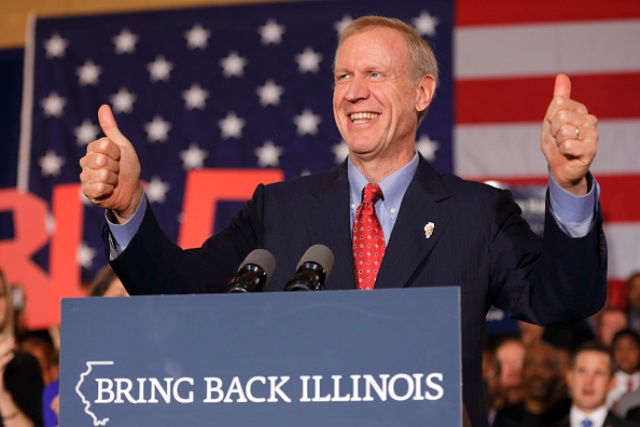It's All Over Except For Pat Quinn's Concession
By Chuck Sudo in News on Nov 5, 2014 7:00PM

Photo credit: John Gress/Getty Images
Republicans drank whiskey neat and thanked their lucky stars Tuesday night after another mid-term election bloodbath saw them take control of the Senate while retaining their majority in the House of Representatives. FiveThirtyEight chief economics writer Ben Casselman summed up the election results thusly:
So voters want a higher minimum wage, legal pot, abortion access and GOP representation. Ok then.
— Ben Casselman (@bencasselman) November 5, 2014The big story in Illinois is Bruce Rauner’s win in the gubernatorial race. Rauner earned 51 percent of the vote to Gov. Pat Quinn’s 46 percent with 98 percent of precincts in Illinois reporting. (Libertarian candidate Chad Grimm earned 3 percent of the vote.) Rauner spent $60 million—including a record $27.6 million of his own money—to win the election and he exchanged his unsoiled Carhartt work jacket and jeans for the blue button down suits he normally favors Tuesday night to declare an end to one-party politics in Illinois.
“The voters have spoken. The voters have asked for divided government for the first time in many years.”
Quinn, however, has yet to declare defeat and indicated he would not do so until every vote is counted. Quinn, referencing polling places that stayed open late due to a shortage of election judges and other issues, told supporters at his post-campaign party, “I don’t believe in throwing in the towel while votes are being counted. We will never yield until all the votes are in.”
Quinn spokeswoman Brooke Anderson told reporters Tuesday night the governor wants to wait until all absentee and provisional ballots have been counted, a process that could take days. It’s a Hail Mary proposition with a gossamer-thin margin of error, a scenario completely eviscerated by ABC 7 anchor Ron Magers during that station’s election night coverage. Opponents of Rauner may want to look for bogeymen to fault for Quinn’s defeat, whether it was the robocalls that screwed with election judges last weekend, Grimm’s candidacy or low voter turnout.
The fact is Quinn is an unpopular incumbent who ran an uninspiring campaign. That, coupled with strong showings by Rauner in suburban Cook County and the collar counties, sealed his fate. Four years ago Quinn was able to beat Bill Brady in the general election by outperforming him in the Chicago area. Rauner earned 46 percent of the vote in the suburbs, 60 percent of the vote in DuPage County and 58 percent in Lake County. He earned 60 percent of the vote downstate and, most damning for Quinn, garnered 22 percent of the vote in Chicago. Experts believed Quinn needed to hold Rauner to below 20 percent in the city if he wanted to win.
If those numbers hold while absentee and provisional ballots are counted, Quinn is only delaying the obvious. In the end, as it usually is, voters were tired of middling improvements in Illinois’ economy and job creation progress under Quinn and decided they wanted a change—“it’s the economy, stupid.”
Whether Rauner is the man to entrust with that is another matter. As much as Quinn stumbled on the campaign trail, Rauner stayed on message and made vague platitudes to voters about wanting to shake things up in Springfield but offered little to no details about how he would go about doing that. Rauner faces the same problems Quinn couldn’t solve: jumpstarting Illinois’ economy; solving a pension morass that’s the worst in the nation; a crumbling infrastructure; and a Democratic-controlled General Assembly that can’t seem to agree on anything unless House Speaker Michael Madigan says “it is done.”
Venture capitalist Rauner, who ran on a faux-populist campaign, has catered to interests in both parties in his climb to the governor’s mansion and the thought of him, Madigan and Mayor Rahm Emanuel uniting in a hardball stance on pension reform should chill the state’s union workers. Rauner said he plans to run Illinois’ government like a business. Whether that involves initiatives that benefit Illinois’ residents or his 1 percent cronies remains to be seen.